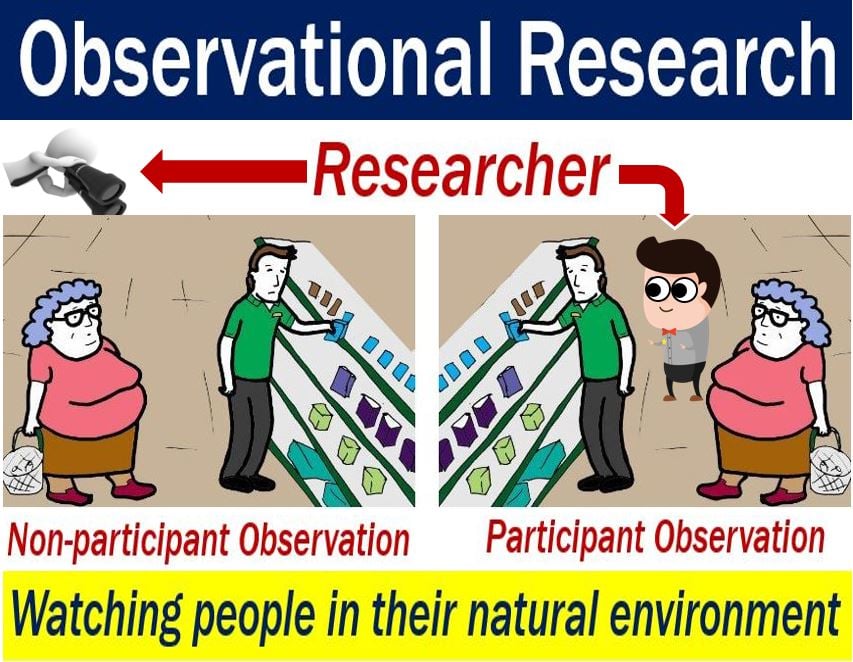Observational research – definition and meaning
Observational research or field research refers to observing the behaviors of people in their natural environment. The researcher observes the study participants in naturally-occurring situations. Observational research is one of the ways people gather market information.
In other words, it is a range of research methods to observe consumer interactions with goods and services. Above all, the researchers observe the study participants in their natural surroundings.
For example, observational research of restaurant customers involves watching their behaviors in a restaurant.
Non-experimental
Observational research is a type of correlational research in which the researchers observe ongoing behavior. In this context, ‘correlational’ means ‘non-experimental.’
For field researchers to be effective, the consumers are typically unaware that people are observing them. This allows the researchers to make an objective analysis.
According to Study.com, we can use this type of study when we know very little about the typical behaviors in a specific setting.
Field research is also useful when we need to gain a deep understanding of the environment.
Observational research is prevalent in marketing and the social sciences. Social sciences include economics, political science, human geography, anthropology, psychology, and demography.
Management, human geography, archaeology, history, and linguistics are also social sciences.

Experimental vs. observational research
Field research differs from experimental research. In experimental research, the researchers create a quasi-artificial environment to control bogus factors.
Additionally, in experimental research, the researchers manipulate at least one of the factors.
With observational research, the researchers do not manipulate any of the factors. In fact, the investigators do not manipulate anything at all – they just watch.
Observational research – pros and cons
-
Pros
– It offers a real-world aspect to a hypothesis. In other words, it can help round out research.
– We can observe people, such as consumers, acting separately or together. Therefore, we can answer several questions regarding consumer behavior.
For example “Do we act differently by ourselves?” or “Do our buying decisions alter in a group setting?”
– Rather than using data in an attempt to predict things, it validates actual results.
– It is ideal in situations in which there is no verbal communication.
– The data is more reliable than self-report metrics. For example, if I want to know whether people smoke, I can watch them or ask them. Watching them gives me more reliable data.
-
Cons
– There is a risk of researcher bias in observational research. In fact, experts say this can be a serious problem.
Researcher bias may occur because we are human, and we have subconscious opinions regarding demographics. Our bias can affect an analysis.
– It is not easy to interpret some human activities and behaviors. We cannot ‘see’ memories or attitudes. In other words, there are many situations where observation alone is not ideal.
– The demographic sample that researchers use may not be representative of the whole population. For example, if I am observing people who came into a store, a few unusual individuals can distort the data.
– Observing people only tells us part of the story. In other words, if we rely exclusively on observational research, we may not get the whole picture.
The following quote comes from UpFrontAnalytics.com:
“As with most research methods, observational research works best in tandem with other methods.”
“A focus group, for instance, could outline thoughts and opinions, while observation showcases actual behavior in real-life situations.”
“Observational research” – example sentences
Below are seven sentences containing the term “observational research,” to show you how the term can be utilized across various disciplines like anthropology, marketing, education, urban studies, wildlife study, and medicine to gather qualitative data.
- “In her anthropology dissertation, she used observational research to gather insights into the social structures of the community.”
- “The marketers conducted observational research at shopping malls to understand consumer behavior patterns more deeply.”
- “Observational research in the classroom setting can provide educators with valuable data on student interactions and learning styles.”
- “The study’s findings were based on observational research, which involved watching how toddlers interact with educational toys.”
- “For his thesis on urban design, he spent months doing observational research in various cities to compare public space usage.”
- “The wildlife documentary was the result of extensive observational research, capturing the natural behaviors of lions in the savannah.”
- “In medical fields, observational research can sometimes reveal patterns and patient outcomes that controlled experiments may miss.”
Video – What is Observational Research?
This video, from our sister channel on YouTube – Marketing Business Network, explains what a ‘Observational Research’ is using simple and easy-to-understand language and examples.

